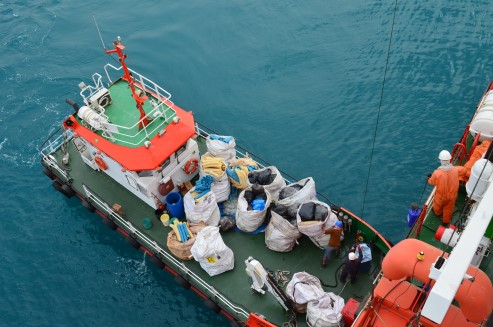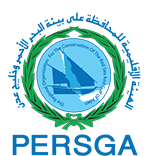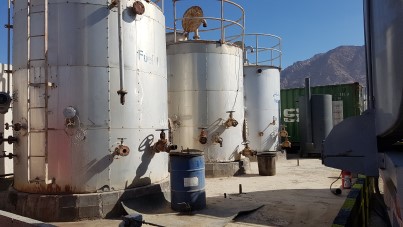The Regional Organization for the conservation of the Environment of the Red Sea and Gulf of Aden (PERSGA) in collaboration with the International Maritime Organization (IMO), has organized a virtual regional training workshop on “the status of the Port Reception Facilities in the Red Sea and Gulf of Aden region” during two days, January 17 – 18 February, 2021.
This regional training workshop comes within the framework of PERSGA ministerial decision adopted during the council meeting of its boards of environment directors held in May 2019 in its headquarters, at Jeddah-Saudi Arabia to declare activating the special status of the Red Sea and Gulf of Aden areas under MARPOL Annex I and V, and in an effort to build the capacities of its member countries in areas related to Port reception facilities for ship-generated wasted/residues.
The Red Sea and the Gulf of Aden (RSGA) have been designated by the International Maritime Organization (IMO) as Special Areas under the International Convention for the Prevention of Pollution from Ship 1973 as modified by the Protocol of 1978 relating thereto, known as MARPOL 73/78. The purpose of a Special Area is the prevention of pollution of the sea in these areas because of their particular sensitivity or other factors. .
The Red Sea was adopted by IMO as Special Area under Annexes I & V in 1973, entered into force in 1983 for Annex I and 1988 for Annex V; while the Gulf of Aden was adopted as Special Area under Annex I in 1987, entered into force in 1989. However, the designations of the Red Sea and the Gulf of Aden as Special Areas under MARPOL are not yet effective. This is because the States in the region have not yet been able to advise IMO that they have established adequate reception facilities for ships calling at their ports as required by the MARPOL convention for ports within Special Area.
The regional Workshop started with an opening speech from Welcome Address by Prof. Ziad−Secretary General of PERSGA highlighting the importance of regional cooperation in making the Red Sea special area effective as soon as practically possible. He emphasized the numerous benefits to member states when the Red Sea special areas take effect and encouraged all PERSGA member states to collaborate towards this ultimate goal. Dr Mahmoud Ahmed representing PERSGA and moderating the virtual sessions followed with his opening introduction setting up the framework of conducting the workshop before giving the floor to Loukas Kontogiannis (Head of Marine pollution – Subdivision for protective measures at IMO) to present the important of reporting of Port Reception Facilities (PRFs) in the region by focusing on the IMO’s Global Integrated Shipping Information System (GISIS) database.
The Workshop was intended for representatives from Government agencies responsible for the implementation and enforcement of MARPOL and port reception facilities (PRFs), with a view to enhance the knowledge and competence of participants on the establishment and efficient operation of Port Reception Facilities in the RSGA, leading towards the effective implementation of MARPOL and PRFs. The workshop was conducted by an international consultant from the Faculty of Environment in UK, covering aspects of MARPOL and port reception facilities with the contribution of one of the Marine Environment Division’s IMO officer.
The ultimate aim of the course was to enable the participants to effectively implement and enforce the PRFs requirement to facilitate making the Red Sea MARPOL special take effect.
During the workshop, lectures were given on the importance of reporting through GISIS global database facilitating the communication and knowledge of many maritime elements including the PRFs existence and feedback from commercial shipping visiting ports and terminals of the world.
Dr Mahmoud Ahmed (PERSGA) highlighted the extensive efforts that the Regional Organisation PERSGA conducted in recent years in capacity building and assisting member states in establishing and implementing MARPOL requirements in general and the PRFs element in particular.
This part was followed by lectures on the provision of Port Reception Facilities for different types of ports, the IMO publication “Port Reception Facilities – How to do it”, the issue of adequacy of port reception facilities for different types of ports, the application of fee systems and waste management planning. The focus on day one interactions was to highlight the gaps within Red Sea and Gulf of Aden to prepare the delegates for the road map of short-term and long-term solutions.
The sessions of this workshop included a case study on the adequacy of hypothetical Port Reception Facilities. This hypothetical case study was circulated beforehand to delegates utilizing empirical data guidance to allow them to practice calculating the adequacy – or inadequacy – of their own Port Reception Facilities.
The second day of the workshop focused on addressing the identified gaps in the establishment and implementation of PRFs in the Red Sea Gulf of Aden. The presentations started with the legal implementation elements and moved on toward the practical elements. Several benchmarking examples were presented as solutions to arrive at the level of acceptable compliance.
During the workshop, there was active interaction between the lecturer and the participants, in relation to the case study circulated and beyond.
The workshop sessions provided the participants with insights and overview on the outcomes of the regional program to assess the adequacy of port reception facilities carried out, how to fill the gaps and overcome barriers to improve the overall waste management from shipping activities; exposing them also with greater understanding on the special status requirements and obligations under MARPOL. Tackling ocean plastic was also discussed.
It was attended by about 35 specialists representing various relevant agencies in PERSGA member states, namely the Republic of Djibouti, the Arab Republic of Egypt, the Hashemite Kingdom of Jordan, the Kingdom of Saudi Arabia, the Federal Republic of Somalia, the Republic of Sudan and the Republic of Yemen.































